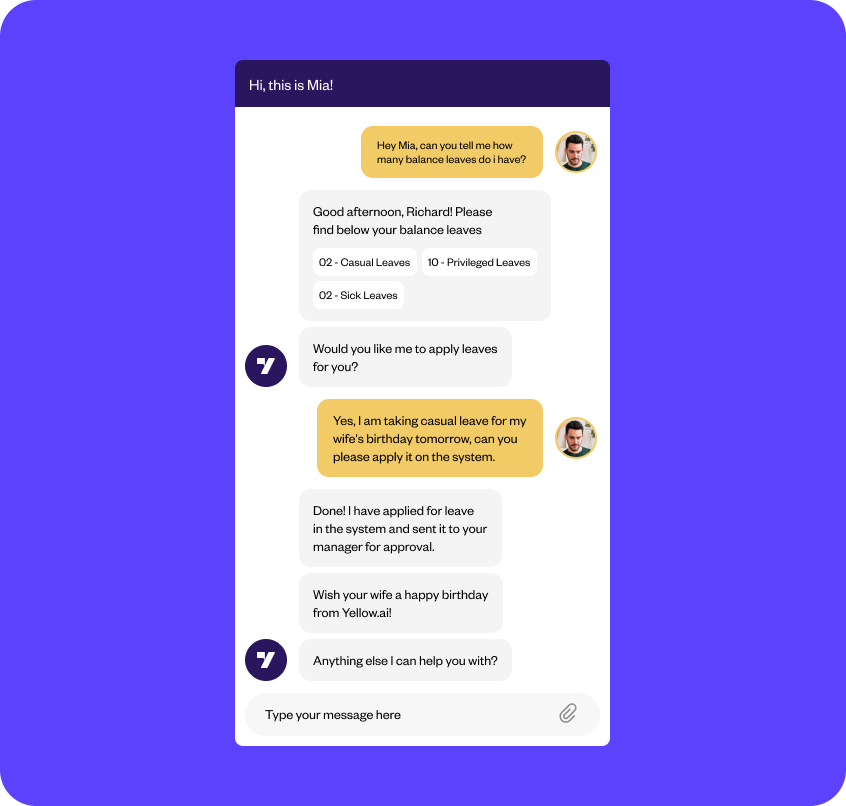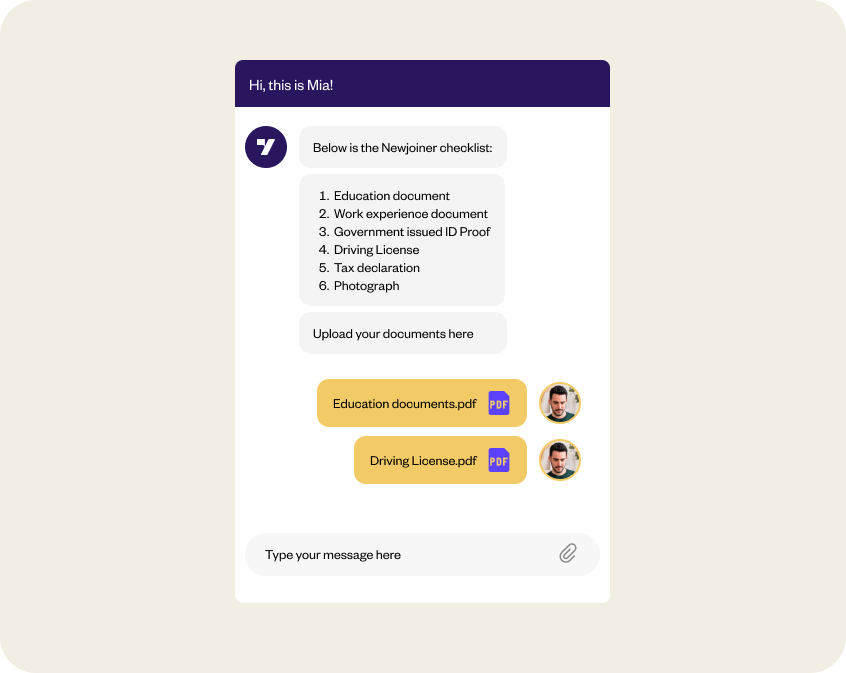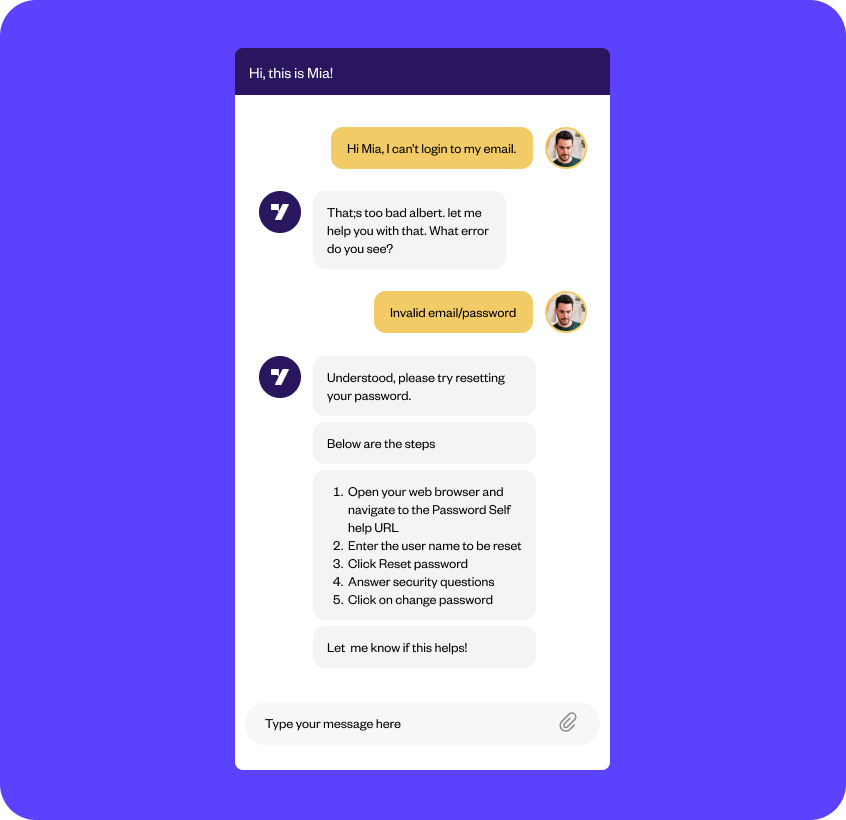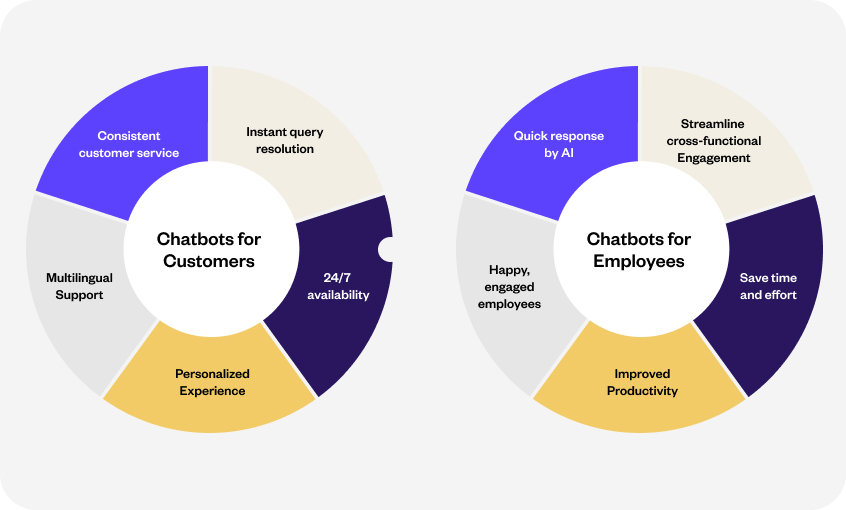In today’s fast-paced digital world, businesses are always on the lookout for exciting ways to make their operations smoother and create memorable experiences for their customers. One groundbreaking technology that has captured widespread attention is enterprise chatbots.
These remarkable AI chatbots are changing the game when it comes to how organizations engage with their valued customers, dedicated employees, and trusted partners.
In this blog, we will explain how businesses can use enterprise chatbots to elevate the experience for customers as well as employees and other internal stakeholders.
Related must-reads:
When we talk about chatbots, we usually consider their customer-facing applications. There’s no doubt in the fact that chatbots today have become invaluable assets for organizations to enhance customer experience. But what about the business applications of chatbots? Can enterprises also use chatbots to improve their employee experience?
Yes, there is really no limit to what you can achieve with the help of intelligent chatbots. And, in today’s article, we are going to see how businesses can use enterprise chatbots to elevate the experience for customers as well as employees and other internal stakeholders.
What are enterprise chatbots?
Enterprise chatbots are automated programs that simulate human conversations. They are not rule-based chatbots that can only handle simple tasks like setting reminders or answering basic questions. Enterprise chatbots are capable of much more than that. They are also known as high-performance or AI chatbot that use machine learning and natural language processing (NLP) to understand users’ intent and handle complex tasks.
We know how chatbots have been here for the longest time. Their growth has been so prominent across a number of industries that now, around 1.4 billion people use them on a fairly regular basis. In fact, 69% of consumers prefer chatbots for receiving instant responses, and Gartner predicts that by 2022, 70% of white-collar workers will interact with them on a daily basis.
Let’s have a deeper look into how they are making as much a difference for employees as they’re making for customers.
Additionally, enterprise chatbots improve how people communicate and share knowledge within the company and enhance agent interaction with customers. They can do many helpful things like quickly providing information, taking care of repetitive tasks to reduce agent workload, guiding employees through processes, and encouraging teamwork among agents while helping them to achieve great CSAT scores.
Use cases for enterprise chatbots solution
The use cases for enterprise chatbots are diverse and span across different functional areas within an organization. Let’s delve into a few key examples to understand the immense potential of these intelligent conversational agents.
1. Customer service chatbots
Today, customers want quick access to company information across various platforms. They expect fast responses and a seamless customer experience around the clock.
According to a recent CX report, 60% of respondents believe that speed is a key indicator of excellent customer service.
This is where enterprise chatbots come in. They are like smart virtual assistants that can handle multiple customer requests at once. By tapping into the company’s internal customer data, chatbots can provide prompt and accurate responses. By embracing chatbot technology, businesses can level up their customer service game and give customers the experience they crave, all while keeping things efficient and budget-friendly, and that too without hiring more staff.
2. Sales and lead generation chatbots
AI chatbots, like Yellow.ai’s advanced multi-LLMs and generative AI-powered Dynamic Automation Platform (DAP), enhance enterprise sales and lead generation. Available 24/7, they engage prospects with personalized interactions, nurturing leads beyond business hours. These chatbots streamline the sales process by automating tasks, providing valuable insights, and refining strategies.
Yellow.ai’s platform enables seamless execution of personalized campaigns across channels, lowering operational costs and generating high-quality leads. It offers a 360° user profile for precise targeting, cuts costs by 60%, and empowers dynamic cross-channel campaigns. Ultimately, this can result in increased conversion rates, improved customer satisfaction, and higher revenue generation.
3. HR support chatbots
The most popular use case of an enterprise ai chatbot solution is HR. Let’s face it, on a daily basis, the HR team spends a lot of time answering the most basic questions about the organization’s policies, framework, and processes.
The HR team can use NLP-powered enterprise chatbots to cater to these straightforward queries and free up their time to focus on more fulfilling tasks. On the other hand, instant replies to their questions will also keep employees happy.
Enterprise chatbots play a vital role in the HR department by streamlining processes and enhancing employee experiences. They assist with onboarding, provide self-service capabilities, handle common inquiries, facilitate performance management, recommend training, gather feedback, and offer HR analytics. By automating tasks and providing timely assistance, enterprise chatbots optimize HR operations and improve employee engagement.

4. Recruitment and onboarding chatbots
Enterprise chatbots are game-changers in recruitment, making the hiring process smoother and more candidate-friendly.

They take on various roles, such as conducting screening interviews, guiding applicants through applications, keeping candidates informed and engaged, providing helpful information and FAQs, assisting with interview scheduling, gathering feedback, and managing talent pools.
By taking care of administrative tasks and ensuring consistent communication, these enterprise chatbots free up recruiters to focus on strategic aspects of hiring, while ensuring a streamlined and pleasant experience for candidates throughout their journey.
During onboarding, enterprise chatbots act as friendly guides, answering questions and providing helpful information about company policies and procedures. With their ability to handle multiple conversations simultaneously, these chatbots are here to revolutionize recruitment and onboarding, making it easier and more efficient for everyone involved.
5. IT helpdesk chatbots
Similar to the HR department, the IT department faces a constant influx of routine questions daily. To address this, IT helpdesk chatbots offer a convenient self-service option for employees, ensuring prompt answers to routine or level 1 queries. These enterprise chatbots can even guide employees through basic troubleshooting steps without the need for IT team involvement.

For more complex issues that require the expertise of an IT professional, employees can submit a ticket using the chatbot. Additionally, companies have the option to integrate their chatbots with existing ITSM (IT Service Management) tools, further streamlining the processes and ensuring seamless information flow between the chatbot and IT systems. This integration enhances efficiency and allows for smoother handling of IT-related concerns within the organization.
Benefits of enterprise chatbots for employees
1. Enhance productivity and efficiency for employees
By leveraging chatbots for enterprises, employees can save valuable time and effort across various business sectors.
Enterprise ai chatbots excel at handling routine questions and inquiries, efficiently addressing up to 80% of basic or repetitive customer queries without human intervention.
This significant capability allows human agents to focus their energy and expertise on resolving more intricate and complex customer issues. As a result, they enhance productivity and enable employees to dedicate their efforts to more challenging tasks, ultimately improving overall efficiency within the organization.
2. Improve cross-functional collaboration among employees
Internal communications within enterprises tend to be largely fragmented, taking place through emails, calls, or various messenger apps. This scattered approach leads to teams operating in isolated silos, increasing the risks of errors and miscommunication. Consequently, not only does the business risk losses but the quality of the employee experience can be significantly impacted.
This is where an enterprise AI chatbot can make a substantial difference. By implementing an AI-powered chatbot platform, organizations can transform cross-functional team engagement. These chatbots act as virtual assistants, simplifying task assignments for managers and providing a seamless way for employees to confirm task statuses with just a single click.
To further optimize cross-functional communication, companies can integrate the chatbot platform into all internal communication channels, including popular messenger apps. This comprehensive integration ensures effortless and efficient communication among employees, facilitating effective collaboration across teams from different departments.
3. Offer onboarding and training support
Research suggests that only 12% of employees in the US agree that their organization has a good onboarding process. Successful onboarding is the deciding factor of employee experience and not to mention, it sets them up for either success or failure.
In such cases, enterprise chatbots can not just assist new hires during the onboarding process, but also provide them with information about company policies, procedures, and resources. They can also offer training support by delivering training materials, quizzes, or interactive modules, ensuring a smooth learning experience for employees.
Quick read: Learn how AI helped Aditya Birla Fashion and Retail enrich employee experience
Benefits of enterprise chatbots for customers
1. 24/7 availability
Recent research suggests that 88% of customers expect a response from businesses within 60 minutes and that 30% expect an answer within 15 minutes or less. With the help of enterprise ai chatbot solutions that are available 24 hours a day, 7 days a week, providing customers with instant responses will never be a problem.
2. Provide personalized service
Enterprise chatbots equipped with natural language understanding (NLU) capabilities can adapt their responses and conversational style based on individual employee interactions. This allows for more natural and personalized conversations, creating a better user experience and building rapport with employees.
They can also analyze user data and past interactions and offer personalized recommendations to customers. Whether it’s suggesting relevant training resources, articles, or tools, these enterprise ai chatbots can help customers discover content that aligns with their specific needs and interests.
3. Handle multilingual queries
The advent of the Internet has revolutionized global business accessibility for customers. With a few clicks, a customer in the UK can effortlessly order a product from North America. As a result, businesses now require multilingual customer support to cater to diverse language needs. However, hiring human agents fluent in multiple languages can be challenging and costly. Thankfully, enterprise ai chatbots offer a practical solution.
They are designed to be multilingual, capable of conversing in over a hundred languages. This means they can effectively address customer queries in various languages and even detect the customer’s language automatically, adapting the conversation accordingly. By leveraging multilingual chatbots, businesses can overcome language barriers, provide seamless support, and deliver a more inclusive and satisfying customer experience.
4. Provide omnichannel support
Research indicates that nearly half (47%) of consumers utilize three to five different communication channels when contacting a brand. To effectively address this trend, implementing an omnichannel customer experience (CX) strategy is crucial.

Omnichannel has emerged as a popular buzzword, representing the ultimate goal of customer engagement—and rightfully so. By deploying enterprise AI chatbots across multiple channels, brands can offer customers a cohesive and integrated experience. This means that customers can interact with a brand through various channels and seamlessly continue their journey from where they left off, without the need to start anew. The power of omnichannel engagement lies in providing customers with a consistent and uninterrupted experience, enabling them to choose their preferred communication channel while maintaining continuity and convenience.
Role of generative AI in enterprise chatbots
Generative AI plays a significant role in enhancing the capabilities of enterprise chatbots. It enables chatbots to generate human-like responses, providing more dynamic and engaging conversations with users.
Here’s a quick overview of how generative AI is powering enterprise chatbots.
- Natural language generation: Enterprise ai chatbots generate natural language responses by analyzing data patterns, and mimicking human conversation.
- Personalization: Generative AI enables chatbots to personalize responses based on user preferences and historical interactions, enhancing customer satisfaction.
- Dynamic content generation: Chatbots generate real-time content like recommendations and FAQs, providing up-to-date and relevant information.
- Creative problem-solving: Generative AI helps enterprise chatbots think creatively and generate innovative solutions to complex problems, assisting users in decision-making.
Important factors to evaluate before rolling out enterprise chatbots
Enterprise chatbots, although dealing with both internal and external communications, should function as a whole. Their role is not just about automating repetitive tasks but also about delivering smooth and efficient engagement across the entire employee and customer lifecycles.
In other words, before deploying a chatbot, make sure that you plan about its different use cases and set the right expectations.
With Yellow.ai, you can bypass the complexities of deploying enterprise AI chatbots from scratch. Leveraging zero-shot learning, Yellow.ai’s DynamicNLP™ sets a new standard in the enterprise conversational AI arena by eliminating the requirement for NLP training. This innovative approach enables you to go live within minutes, making the implementation process hassle-free and efficient.
Here are a few things to keep in mind before deploying enterprise ai chatbot solutions:
- Define objectives: Clearly articulate the specific goals and objectives you wish to achieve with the deployment of enterprise chatbots. Determine the key challenges or tasks you want the chatbots to address, such as improving customer service, automating internal processes, or enhancing employee engagement.
- Choose the right platform: Select a suitable enterprise chatbot platform that meets your requirements. Consider factors like scalability, integration capabilities, natural language processing (NLP) capabilities, and support for multiple communication channels. Popular chatbot platforms like Rasa, Botpress, and Dialogflow offer a range of features to support your deployment needs.
- Design conversational flows: Design the conversational flows and dialogue structure for your chatbots. Map out user interactions, define intents (user intentions), and identify entities (important information) that the chatbots should understand. Utilize the tools and resources provided by the chosen chatbot platform to create and visualize these conversational flows.
- Train the chatbots: Train the enterprise chatbots by providing them with sample conversations and data. Utilize machine learning techniques to train the chatbots’ NLP models, enabling them to accurately comprehend user inputs and generate relevant responses. Continuously refine the training process to improve the chatbots’ performance.
- Test and iterate: Conduct comprehensive testing to ensure the chatbots operate as intended. Test them with various user scenarios and gather feedback to identify areas for improvement. Iterate on the design, dialogue, and responses of the enterprise ai chatbots based on user feedback, ensuring a more effective and satisfactory user experience.
Enterprise chatbots – FAQs
What’s the difference between a chatbot and an enterprise AI chatbot?
A chatbot is a computer program designed to simulate human conversation and interact with users through text or voice-based channels. It can be used for various purposes, including customer support, information retrieval, and task automation. Chatbots are often built using natural language processing (NLP) techniques to understand user inputs and generate appropriate responses.
On the other hand, an enterprise AI chatbot is specifically tailored for use within organizations or businesses. It is designed to automate and streamline internal processes, communication channels, and interactions within the enterprise. Enterprise AI chatbots focus on enhancing efficiency, productivity, and collaboration within the organization. They are equipped with advanced AI capabilities, such as machine learning and data integration, to provide more sophisticated functionalities.
What is a regular enterprise bot?
A regular enterprise bot, also known as an enterprise chatbot or business bot, is a computer program designed to automate and streamline specific tasks or processes within an organization. It is typically deployed within the enterprise environment to assist employees and enhance operational efficiency.
What is an enterprise chatbot and how does it differ from a regular chatbot?
An enterprise chatbot is like a specialized assistant tailor-made for businesses and organizations. It’s equipped with advanced capabilities to tackle intricate tasks, seamlessly connect with systems, and support various business operations. Unlike basic chatbots, it does more than just answering frequently asked questions. It can retrieve data, automate workflows, and integrate smoothly with the existing systems your organization relies on.
How much does an enterprise chatbot cost?
The cost of an enterprise chatbot can vary significantly depending on various factors such as the complexity of the chatbot, the chosen platform or development approach, customization requirements, integration with existing systems, and ongoing maintenance and support. You can check Yellow.ai’s easy-to-deploy enterprise chatbots backed by generative ai pricing right here.
What is the future outlook for enterprise chatbots and how are they evolving?
The future of enterprise chatbots is promising, with advancements focusing on increased intelligence and versatility. They are evolving to understand and process natural language more effectively, integrating advanced machine learning techniques to continually improve responses. Integration with enterprise systems allows access to real-time data and automation. Omnichannel support ensures consistency across multiple platforms. Conversational AI technologies, such as natural language understanding and dialogue management, are advancing to create more human-like interactions. Overall, enterprise chatbots are poised to become sophisticated, personalized, and integral tools for businesses.
How do enterprise chatbots ensure data security and privacy for sensitive business information?
Enterprise chatbots ensure data security and privacy for sensitive business information through encryption, access control, secure protocols, role-based access, anonymization, data retention policies, regular security audits, compliance with data protection regulations, employee training, and secure infrastructure. These measures protect data during transmission, restrict unauthorized access, comply with regulations, and promote secure practices. By implementing these measures, chatbots strive to safeguard sensitive information and maintain the confidentiality, integrity, and availability of data.
Wrapping up
The key to a great customer experience is what goes on inside your organization. Happy employees make for happy customers. This is why, in 2024, to gain a competitive edge, you should focus on enhancing both your external as well as internal customer experiences.
Furthermore, with Yellow.ai’s no-code chatbot builder and agent-assist dashboard, you can discover new avenues of growth. Learn how Yellow.ai can help you enhance the total customer experience of your business; get a free demo today!



















